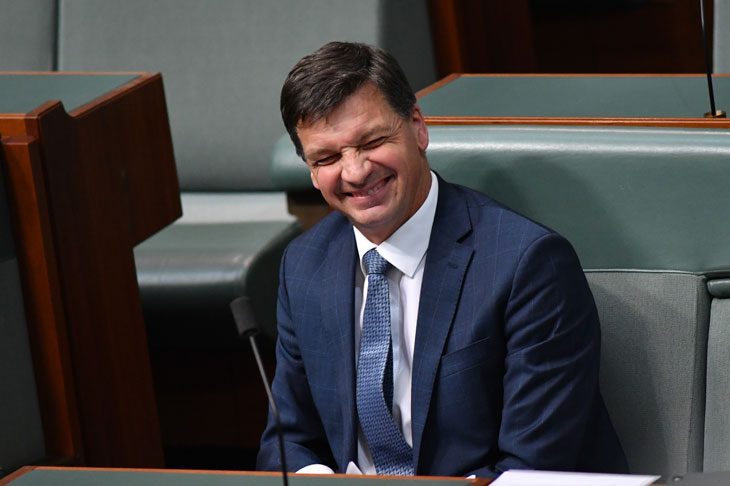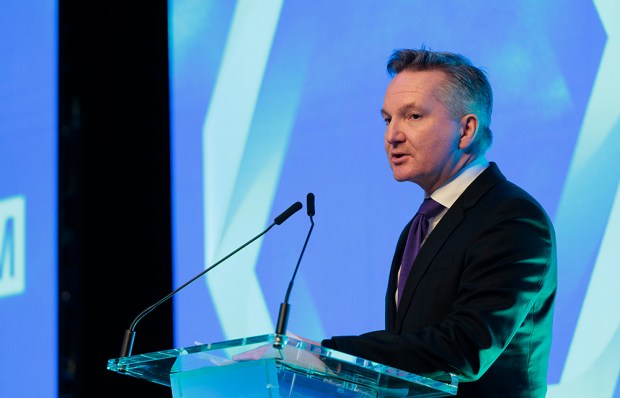Who is really in charge of setting and implementing Australia’s energy policy? Is it the Morrison government which last week circulated its policy position discussion paper for responses by 21 June? While advocating more big spending on clean energy, it is wary of a 2050 target for zero emissions without a plan to achieve it, highlights gas, features hydrogen, commends carbon capture and storage (which environmentalists reckon is only a cover for maintaining a coal option) and even suggests nuclear. Or is it the zero-emissions-obsessed boards of Australia’s banks that have declared a Paris-inspired fatwa on fossil fuels and want a price on carbon? The absence from Energy Minister Angus Taylor’s Technology Investment Roadmap – A framework to accelerate low emissions technologies of any mention of new coal-fired power generation (not even the proposal in North Queensland at present under a government-funded feasibility study) indicates the government is bowing to the reality of no bank lending to coal coupled with emissions intensity rules that put fossil-fuel electricity generation in limbo. ‘Reduction of the emissions intensity of electricity networks is critical for the economy to reach zero emissions by 2050’ is Westpac’s justification. So unless a free-enterprise government intends to change its political spots and restore government-ownership to electricity generating, there’s not much point having a coal-fired electricity policy if no one will fund it, no matter how soundly based are the protests from the well-informed coal advocates on the back-benches.
As politics is the art of the achievable, not of what is ideal, Taylor’s forced concession on coal makes it even more vital that he wins his next battle with the banks – over gas. Climate activist pressure on the banks has not been only about coal; the target remains all fossil fuel. As Westpac’s environment statement says ‘We are committed to managing our business in alignment with our support for the Paris Climate Agreement and the need to transition to a net zero emissions economy by 2050’, and is limiting its financing of the electricity generating sector to the Paris-aligned transition pathway. So far this has meant that three quarters of Westpac’s current $4 billion exposure to electricity generating is in renewables against only a declining 14 per cent in natural gas
The campaign against gas is already mounting, with the SMH reporting that environmental groups are opposing gas even as a transition fuel; with SBS claiming that ‘Climate scientists say putting the focus back on gas would be “a waste of a monumental amount of money”’; and with the ABC (inevitably) lamenting that Australia ‘looks set to be pushed towards a gas-fired future’ by the National Covid-19 Coordination Commission after its chairman, Neville Power, said an increase in the supply of natural gas would benefit manufacturing business by bringing energy prices down to competitive levels. Suggesting conflicts of interest issues, the ABC reported ‘The make-up of the commission is causing concern for some [naturally unnamed] business leaders and activist groups advocating stronger emissions reduction and promoting clean energy.’ It quotes a report from Advocacy 350 raising concerns that ‘close to half of the members of the Commission have ties to the fossil fuel industry’.
Taylor’s unassailable clincher on gas with the banks is that ‘more gas means more capacity to absorb intermittent renewables into the grid because gas is flexible, dispatchable generation’. The prospect that the banks may stand up to their climate activist allies to support Taylor on gas is enhanced by Westpac’s environmental statement. In acknowledging that ‘gas will be playing a role over the medium term, particularly to provide “firming” for intermittent renewable energy sources’, the bank will ‘continue to assess the role of oil and gas in the transition to a low carbon economy and to develop Paris-aligned financing strategies and portfolio targets for emissions intensive sectors’. In the interim it will continue to provide finance to the sector ‘in line with our commitments to the Paris Agreement’. There is also hope in the undertaking to ‘Take into account the intersecting requirements of emissions reduction, affordability, energy security and reliability and the feasibility of emerging low emissions technology such as carbon capture and storage’. Should Taylor bank on their support?
Got something to add? Join the discussion and comment below.
Get 10 issues for just $10
Subscribe to The Spectator Australia today for the next 10 magazine issues, plus full online access, for just $10.
You might disagree with half of it, but you’ll enjoy reading all of it. Try your first month for free, then just $2 a week for the remainder of your first year.














Comments
Don't miss out
Join the conversation with other Spectator Australia readers. Subscribe to leave a comment.
SUBSCRIBEAlready a subscriber? Log in